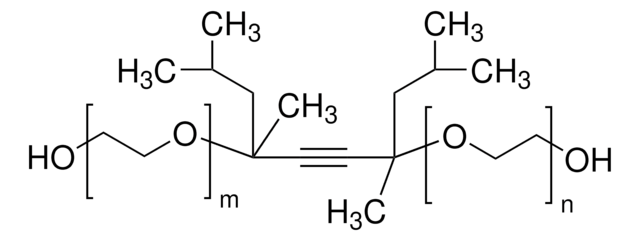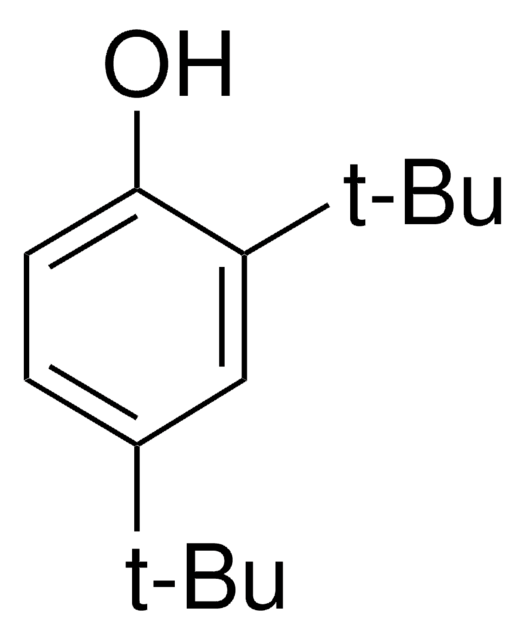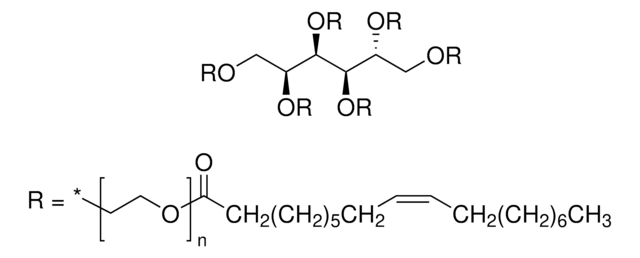278386
2,4,7,9-Tetramethyl-5-decyne-4,7-diol, mixture of (±) and meso
98%
Sign Into View Organizational & Contract Pricing
All Photos(2)
About This Item
Linear Formula:
(CH3)2CHCH2C(CH3)(OH)C≡CC(CH3)(OH)CH2CH(CH3)2
CAS Number:
Molecular Weight:
226.36
EC Number:
MDL number:
UNSPSC Code:
12352103
PubChem Substance ID:
NACRES:
NA.23
Recommended Products
Quality Level
Assay
98%
bp
255 °C (lit.)
mp
42-44 °C (lit.)
HLB
4
SMILES string
CC(C)CC(C)(O)C#CC(C)(O)CC(C)C
InChI
1S/C14H26O2/c1-11(2)9-13(5,15)7-8-14(6,16)10-12(3)4/h11-12,15-16H,9-10H2,1-6H3
InChI key
LXOFYPKXCSULTL-UHFFFAOYSA-N
Related Categories
General description
2, 4, 7, 9-tetramethyldec-5-yne-4,7-diol is a well-known acrylic adhesive. It has amphiphilic characteristics. It is used a dopant in a heterojunction solar cell, it assists in the formation of a homogeneous interfacial layer over the photoactive layer. Doping results in decreasing the absorption of photons in the underneath photoactive layer, thereby in enhancing the photocurrent density.
Application
2, 4, 7, 9-tetramethyldec-5-yne-4,7-diol may be used to dope poly[9,9-bis(6′-(diethanolamino)hexyl)-fluorene],that acts as an interfacial layer in a heterojunction solar cell.
Signal Word
Danger
Hazard Statements
Precautionary Statements
Hazard Classifications
Aquatic Chronic 3 - Eye Dam. 1 - Skin Sens. 1
Storage Class Code
13 - Non Combustible Solids
WGK
WGK 1
Personal Protective Equipment
dust mask type N95 (US), Eyeshields, Gloves
Choose from one of the most recent versions:
Already Own This Product?
Find documentation for the products that you have recently purchased in the Document Library.
Customers Also Viewed
Partition and diffusion of volatile compounds from acrylic adhesives used for food packaging multilayers manufacturing
Cabellas E, et al.
Journal of Materials Chemistry, 20, 5100-5109 (2010)
Elena Canellas et al.
Food additives & contaminants. Part A, Chemistry, analysis, control, exposure & risk assessment, 34(10), 1721-1729 (2017-03-24)
The suitability of an acrylic adhesive used on food packaging was studied. Six potential migrants were identified using GC-MS and UPLC-QTOF. Five compounds were intentionally added (2-butoxyethanol and 2,4,7,9-tetramethyl-5-decyne-4,7-diol 10 (TMDD) and TMDD ethoxylates). One of the compounds identified as
Enhanced performance in bulk heterojunction solar cells with alkylidene fluorene donor by introducing modified PFN-OH/Al bilayer cathode
Heo SW, et al.
Royal Society of Chemistry Advances, 4, 6776-6781 (2014)
Betsy T Kren et al.
Breast cancer research : BCR, 17, 19-19 (2015-04-04)
Targeted therapies for aggressive breast cancers like triple negative breast cancer (TNBC) are needed. The use of small interfering RNAs (siRNAs) to disable expression of survival genes provides a tool for killing these cancer cells. Cyclin dependent kinase 11 (CDK11)
Our team of scientists has experience in all areas of research including Life Science, Material Science, Chemical Synthesis, Chromatography, Analytical and many others.
Contact Technical Service













